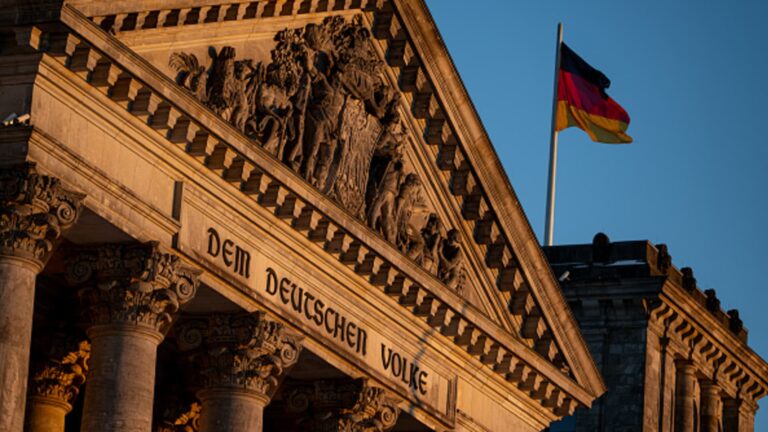The evening sun shines on the Reichstag building of the German Bundestag with the inscription “Dem Deutschen Volke.
Fabian Sommer | Picture Alliance | Getty Images
BERLIN — The Christian Democratic Union and the allied Christian Social Union secured the largest share of votes in the German federal election on Sunday, according to exit polls from German broadcaster ZDF.
This puts the party’s lead candidate Friedrich Merz in prime position to take over from Olaf Scholz as chancellor of Europe’s largest economy.
The CDU-CSU won 28.5% of votes, with the far-right AfD in second place with 20% and Scholz’s Social Democratic Party coming in third with 16.5%, according to ZDF exit polls data.
“We have won it because the CDU and CSU worked well together and we prepared very very well for this election and also for taking over governing responsibility,” Merz said, according to a CNBC translation, extending thanks to CSU chief Markus Söder and other supporters. “It was a great campaign.”
He acknowledged that the challenges would not be easy to tackle, noting it was now time for political groups to hold talks and set up a new government as soon as possible.
“It is a bitter election result for the Social Democratic Party. It is also an election defeat, [and] I think that needs to be said once clearly, from the start, given a result like this,” Scholz said at the party’s headquarters, as he thanked campaigners and supporters. He said he took responsibility during the previous federal vote, when the SPD achieved a better performance and that “this time the election result is bad and therefore I also have responsibility for this election result.”
Scholz also congratulated Merz and the CDU-CSU on their own voting outcome.
The CDU and its regional sister party the Christian Social Union were topping the polls in the lead-up to the election, with support dipping slightly just ahead of the vote. The far-right AfD was polling in second place, followed by the SPD.
This marked a drop in support for the SPD, which took the top spot during the 2021 election, followed by the CDU/CSU. The AfD clinched fourth place at the time.
Germans cast two votes on Sunday, one to directly elect a member of parliament to represent their constituency and one for a party list. The second vote determined the proportional make-up of the German Parliament, the Bundestag, with parties sending their candidates to Berlin to ensure representation.
Parties also must meet a 5% threshold to be able to garner seats in parliament. Crucially, the groups that tend to secure around this level of votes often become so-called kingmakers of coalition building after the election.
A key focus around the election has been how smaller parties fare, which could impact both coalition building and the ability of the incoming government to reform constitutional rules, for example around spending and debt. They would need a two-thirds majority to do so.
Observers were also closely watching the performance of the far-right…
Read More: German 2025 federal election results



